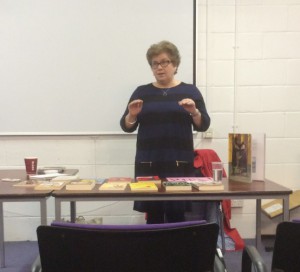On the 13th of November, Lindsey Fraser of Fraser Ross Associates visited us here at Stirling to give a talk on the role of the literary agent.
Lindsey began by reminiscing of a time when book publishing was simpler. Books had one price; that which was displayed on the book jacket, and books were limited to paperback and hardback formats.
As the publishing industry adapted to reflect changes in the digital landscape, it became apparent that authors needed representatives who had their best interests at heart and would help them to manoeuvre the unfamiliar realm of publishing.
Having spent ten years working for the Scottish Book Trust, Lindsey and colleague Kathryn Ross had established that there was a need amongst Scottish authors for agent representation, and so they left the Scottish Book Trust in order to create Fraser Ross Associates. They are now part of the small literary agent community which forms The Association of Scottish Literary Agents.
When speaking specifically about the role of the agent, Lindsey said that she considers literary agents to be responsible for finding the best possible homes for books. She also expressed that a major part of the role is giving your writers confidence, and that it is important to remember that agents are sometimes the only contact that writers have with the world of publishing. Trust is essential in this relationship.
Lindsey went on to highlight that the agent is on the side of the author, and ultimately it is their aim to help the author make money from their writing. The agent also encourages the writer to respect publisher deadlines and teaches them how to deal with promotional events as well as showing them how to make the most of opportunities that are presented to them.
Talking more about the encouragement that should be offered to authors, Lindsey noted that they are particularly vulnerable after having their first book published and are beginning to consider the next. It is important to help them through this period of insecurity. She commented that authors have a tendency to look at what was not right with their book and need to be reminded of what was good. She also said that sometimes after having a book published, authors would like to have a period of rest, but there is an important issue here regarding the children’s book industry. Children grow up quickly, and their interest in certain books changes. If you are publishing a children’s series, you need to ensure that the books are published before your readership outgrows them. Sometimes it is necessary for an author to produce a number of books in quick succession, especially if their books are doing well. 
Nearing the end of the talk, we were informed of The Scottish Book Trust’s live literature scheme which provides funding for author visiting sessions at schools in Scotland. They pay half of the author’s fee as well as traveling expenses which allows more schools to benefit from visiting sessions while authors also get to promote their books and interact with their readers on a more personal level.
Lindsey’s talk offered wonderful insight into the role of an agent in the publishing industry. She shared with us her refreshingly honest thoughts and opinions regarding some issues within the industry, and I particularly liked her comparison of the Bologna Children’s Book Fair to speed dating which highlighted once more the importance of networking in this industry.
